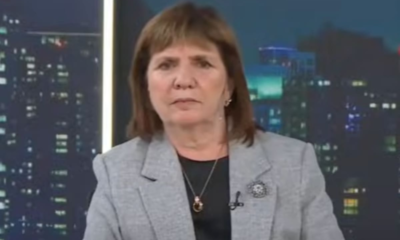INTERNACIONAL
Officials in Biden admin worked to undermine Netanyahu after ceasefire talks collapsed, former aide says
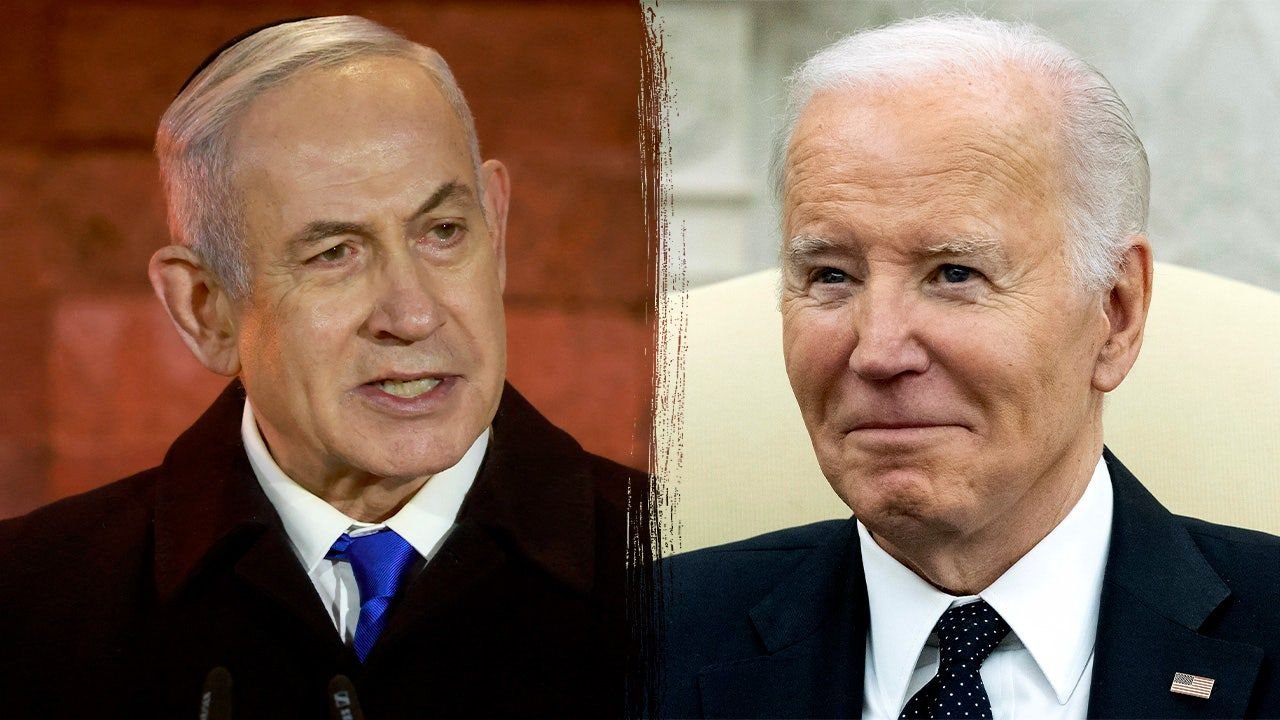
A new bombshell report on an Israeli TV news show revealed Biden officials discussed the idea of working to trigger an election with the hope of defeating Israeli Prime Minister Benjamin Netanyahu so they could push the president’s ceasefire deal.
The plan was ultimately blocked by the president.
One of the president’s advisors on the region said that after the first ceasefire deal in the Israel-Hamas war collapsed, the idea of working against Netanyahu started to circulate in President Joe Biden’s administration, according to former White House officials interviewed on Israel’s Channel 13 show «HaMakor.»
The idea floated was that Biden would give a speech directly to the Israeli public, presenting two options, according to his Middle East advisor Ilan Goldenberg. «A lot of people were talking about, including in the Oval Office at times, the idea of, like, the President going out and giving a speech. Benny Gantz (the opposition leader) was at 37 [seats] and Bibi was like at 15, right? Like, he was very weak. Joe Biden was still incredibly popular in Israel,» he claimed.
BIDEN CRITICIZES NETANYAHU OVER ISRAEL-HAMAS WAR, SAYS ISRAELI LEADER MAKING A ‘MISTAKE’
Israeli Prime Minister Benjamin Netanyahu meets with IDF commanders in the Netzarim Corridor in Gaza to discuss Hamas activity on Nov. 19, 2024. (Photo provided by TPS)
Goldenberg said, «The idea was that Biden would say you can end the war, get all the hostages out, get a deal that includes even, you know, maybe trying to have elements of Hamas leave — or you can keep doing what you’re doing, and Israel will be in a Forever War. Your sons and daughters are going to keep fighting. Most of the hostages are going to come home dead. The idea would be either to force Netanyahu to come on board with that or scramble Israeli politics and see if you could trigger elections. That’s what people were saying, like, ‘let’s just break this up because it’s not going anywhere good.’»
However, Goldenberg said Biden blocked the move. «I think at the end of the day, he [Biden] was uncomfortable with the idea of going out that directly against Netanyahu.»
At a moment when U.S.-Israeli cooperation was vital, the deep mistrust and personal tensions between former President Biden and Prime Minister Netanyahu threatened to derail key diplomatic opportunities. The recent report featured insights from nine senior Biden administration officials and sheds light on the complexities that defined their interactions.
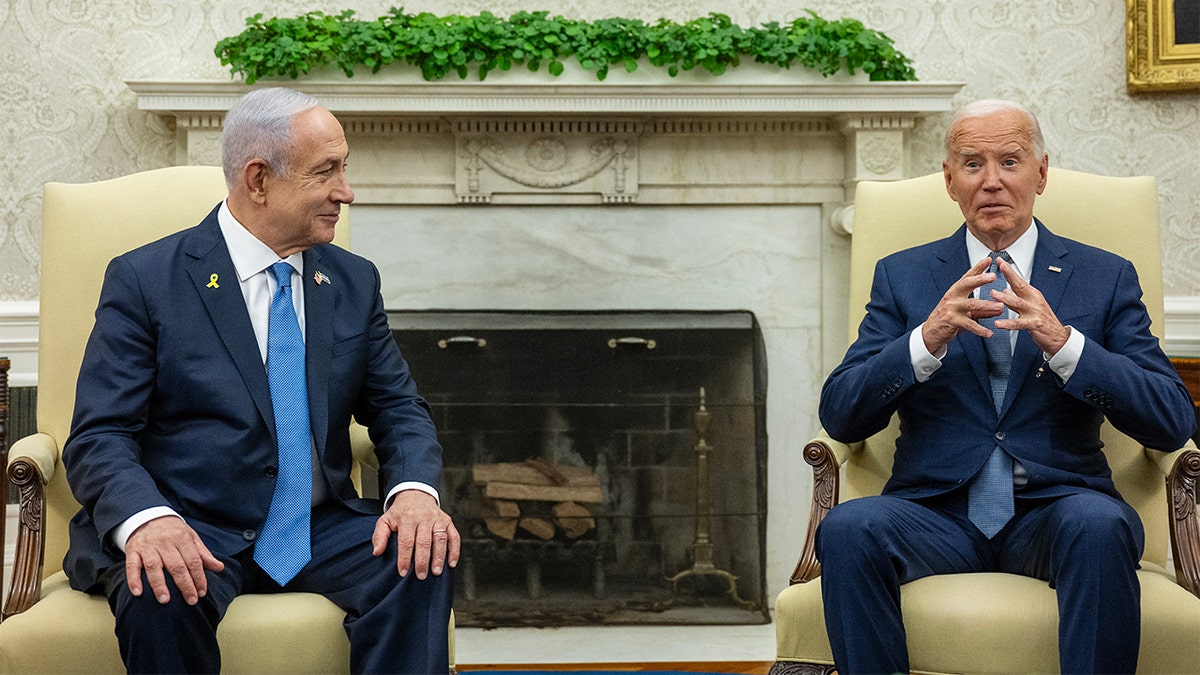
President Joe Biden meets with Israeli Prime Minister Benjamin Netanyahu in the Oval Office of the White House on July 25, 2024. (Jim Watson/AFP via Getty Images)
Tom Nides, former U.S. ambassador to Israel, recalled how the president frequently clashed with Netanyahu’s leadership.
«Biden didn’t really trust Netanyahu,» Nides said. «Netanyahu, I mean, come on everybody, he’s a survivor, a manipulator, you know, a magician when it comes to relationships. Biden saw all of that.»
KAMALA HARRIS’ PICK FOR JEWISH LIAISON DRAWS CRITICISM OVER ISRAEL, IRAN VIEWS: ‘RED FLAG’
Before Oct. 7, tensions focused on Netanyahu’s push for judicial reform, which sparked massive demonstrations and clashes among the Israeli public. «I was in the middle of all this… I had many a screaming match with Ron Dermer (Israel’s Minister of Strategic Affairs) about this,» Nides said. Biden repeatedly urged Netanyahu to slow down and seek consensus, while anxieties rose over figures like far-right nationalist Minister Ben Gvir.
«There were lots of anxieties over the issues around judicial reform, which I thought was insane,» Nides said.
The personal tension sometimes erupted publicly. When asked if Biden ever used harsh language for Netanyahu, Nides said, «President Biden likes to use colorful language, and on occasion, the prime minister was able to extract that colorful language from the president.» He said Netanyahu questioning Biden’s commitment to Israel particularly infuriated him.

This image, made from undated bodycam video footage taken by a downed Hamas terrorist and released by the Israel Defense Forces, shows a Hamas terrorist walking around a residential neighborhood at an undisclosed location in southern Israel. Israel’s military brought together a group of foreign correspondents on Monday, Oct. 16, 2023 to screen a 40-minute reel of gruesome footage compiled from the Hamas attack on Oct. 7. (Israel Defense Forces via AP)
After Oct. 7, when Biden became the first sitting president to visit Israel during wartime, tensions deepened as Netanyahu rejected U.S. plans for Gaza’s future. According to Michael Herzog, Israel’s then-ambassador to Washington, Biden believed Netanyahu was aiding Trump politically, while Netanyahu suspected Biden of deliberately «walking on his head.»
The tension extended to hostage negotiations. National Security Advisor Jake Sullivan said Hamas was reluctant to talk seriously for months. When asked if Netanyahu added conditions, he said, «I’m not saying that.»
Unlike their public statements, Arab leaders were quietly supporting Israel’s efforts to defeat Hamas, Dan Shapiro, former deputy assistant secretary of Defense, revealed in the interview. «They said very clearly, please tell the Israelis they have our support to wipe out Hamas,» he said.
CLICK HERE TO GET THE FOX NEWS APP
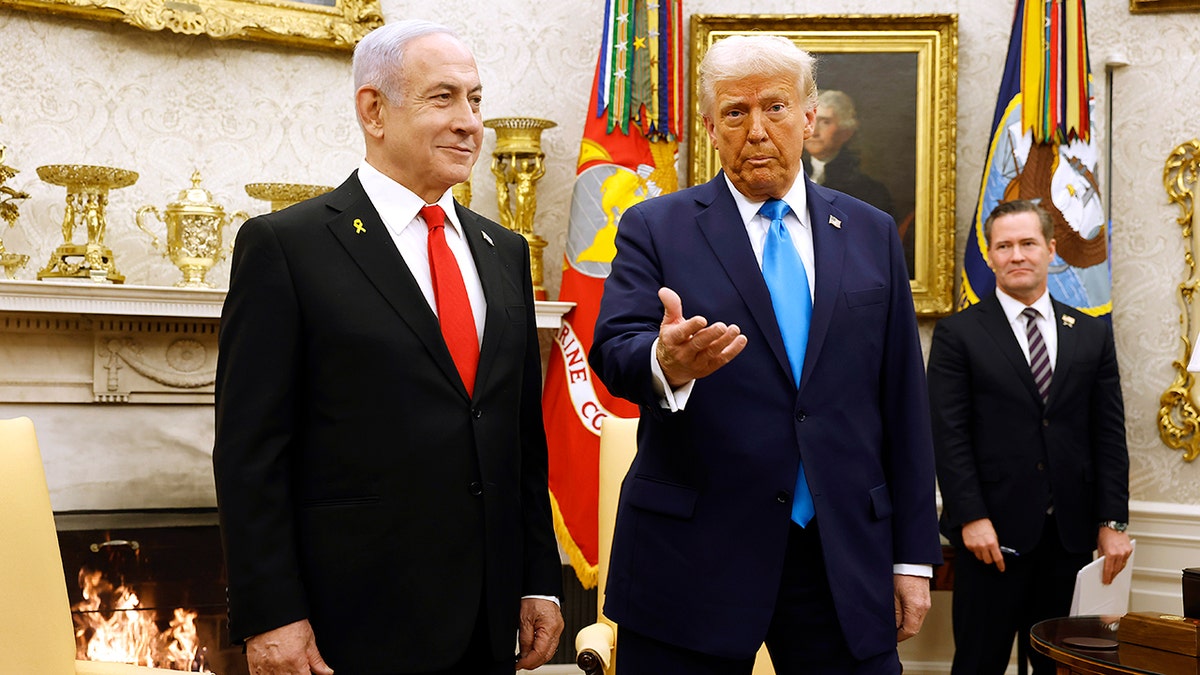
President Donald Trump and Israeli Prime Minister Benjamin Netanyahu meet at the White House on Feb. 4, 2025. (Anna Moneymaker/Getty Images)
At the same time, while tensions with Netanyahu were growing, a major opportunity was slipping away. Amos Hochstein, former U.S. special envoy for International Energy Affairs, called Saudi Arabia «the most important Muslim country in the world,» describing Crown Prince Mohammed bin Salman as a historic figure capable of reshaping the region.
Herzog, Israel’s former ambassador to Washington, confirmed that serious discussions had taken place about advancing normalization during the transition period before Trump could return to office. «Biden would bring Democrats, and Trump would bring Republicans,» Herzog explained, but said that Trump preferred to wait, not wanting to share the achievement. «I believe it will happen, I just don’t know when,» Herzog said.
Fox News Digital sent questions to former President Biden’s spokesperson for comment.
INTERNACIONAL
Hillary Clinton sounded alarm on Biden’s political viability ‘by 2024,’ Klain told House investigators
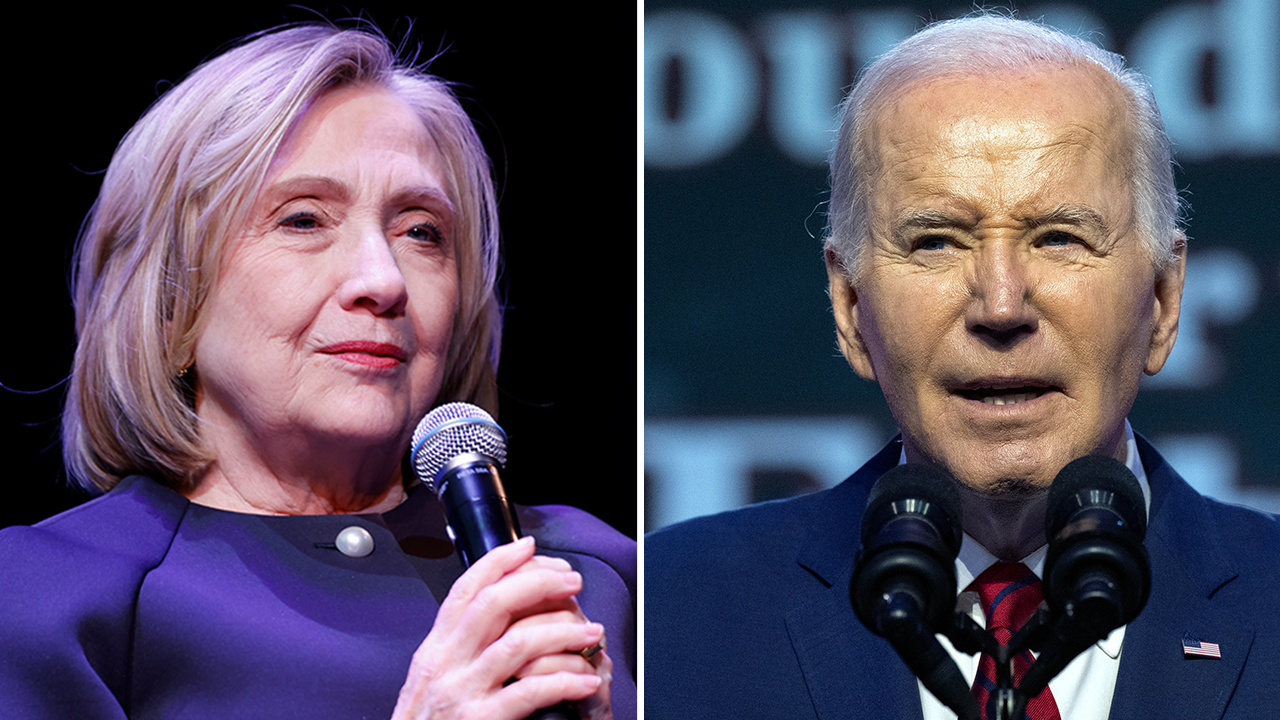
NEWYou can now listen to Fox News articles!
Ex-President Joe Biden’s former chief of staff Ron Klain told House investigators that Hillary Clinton approached him with concerns about the octogenarian leader’s political viability «by 2024,» Fox News Digital has learned.
Klain spoke with staff on the House Oversight Committee for over five hours on Thursday, as Committee Chairman James Comer, R-Ky., continues to probe whether top Biden aides concealed signs of mental decline in the ex-president.
A source familiar with his voluntary interview told Fox News Digital that Klain believed Biden was mentally sharp enough to serve as president, and was not too old to run.
But the ex-secretary of state and former Biden national security adviser Jake Sullivan both «approached Ron Klain stating they believed Joe Biden was not politically viable» months before he dropped his re-election bid in July 2024, the source said.
COMER DISMISSES BIDEN DOCTOR’S BID FOR PAUSE IN COVER-UP PROBE: ‘THROWING OUT EVERY EXCUSE’
Former Secretary of State Hillary Clinton shared concerns about ex-President Biden’s political viability by 2024, a source said. (Getty Images)
Sullivan told Klain that Biden «was less effective in 2024 compared to 2022,» the source said.
It’s not immediately clear if Biden’s mental acuity was the reasoning for their doubts, nor if they made the case to Klain together or separately.
But it’s a significant indictment coming from top national Democrats of Biden in general, long before concerns about his fitness for office within the party were made public knowledge.
Sullivan had been a top aide to both Biden and Clinton, having served as the latter’s senior policy advisor during her 2016 campaign.
Klain, who served as White House chief of staff for the first half of Biden’s term, conceded that the then-president was less energetic and more forgetful, though he defended his «acuity to govern,» the source said.
«Mr. Klain stated that President Biden often confused names and proper nouns, and it got worse over time,» the source said.
Fox News Digital was told that Klain also said there was no reason to doubt President Donald Trump’s own mental fitness.
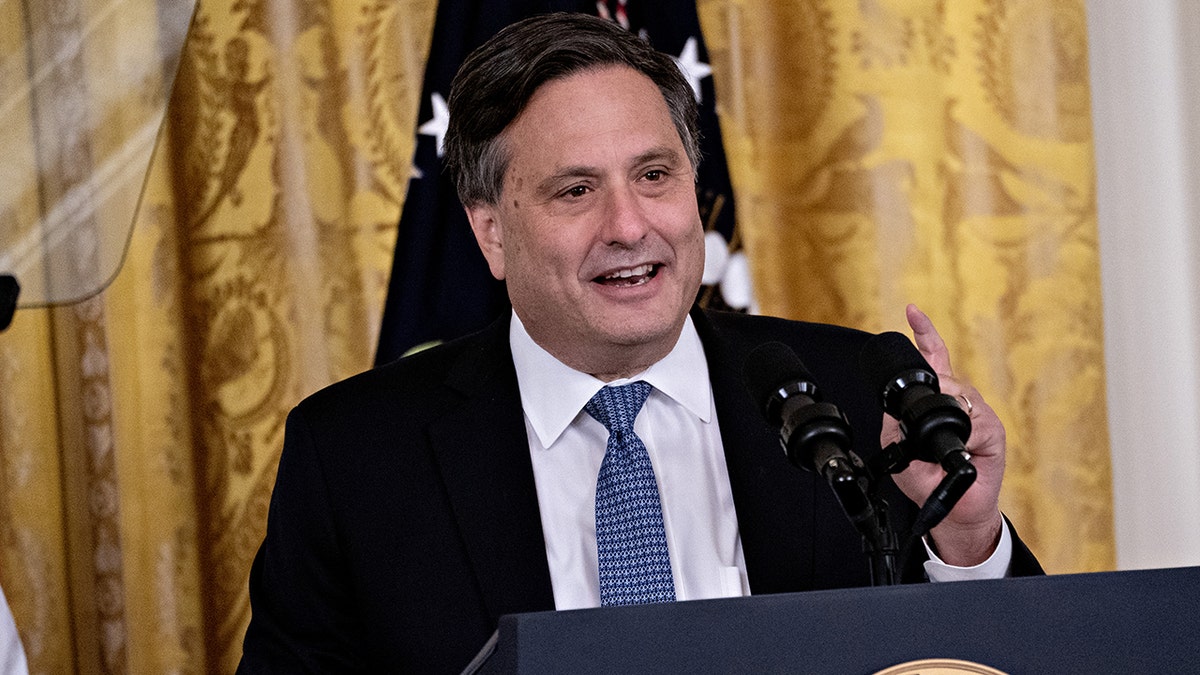
Ron Klain, former White House chief of staff, allegedly made the revelation to House investigators (Andrew Harrer/Bloomberg via Getty Images)
Klain said nothing to reporters when going in or out of the committee room Thursday.
He’s the sixth former Biden administration aide to appear for Comer’s probe.
And despite the interview being largely staff-led, Comer did make an appearance for the early half of the sit-down, and Reps. Andy Biggs, R-Ariz., and Ro Khanna, D-Calif., were both briefly there as well.
Both Biggs and Khanna called Klain «credible» from what they saw inside the room.
«I think he is telling what he knows accurately,» Biggs told Fox News Digital.
FAR-LEFT FIREBRAND SAYS SHE ‘NEVER HAD A CONCERN’ ABOUT BIDEN’S MENTAL STATE AS HOUSE PROBE HEATS UP
On the other side of the aisle, Khanna told reporters, «He answered every single question. He was fully cooperative.»
Three other former Biden White House aides who previously appeared – Annie Tomasini, Anthony Bernal, and ex-White House doctor Kevin O’Connor – all appeared under subpoena and pleaded the Fifth Amendment to avoid answering questions.
Longtime Biden aide Ashley Williams and ex-staff secretary Neera Tanden, like Klain, came for voluntary transcribed interviews.
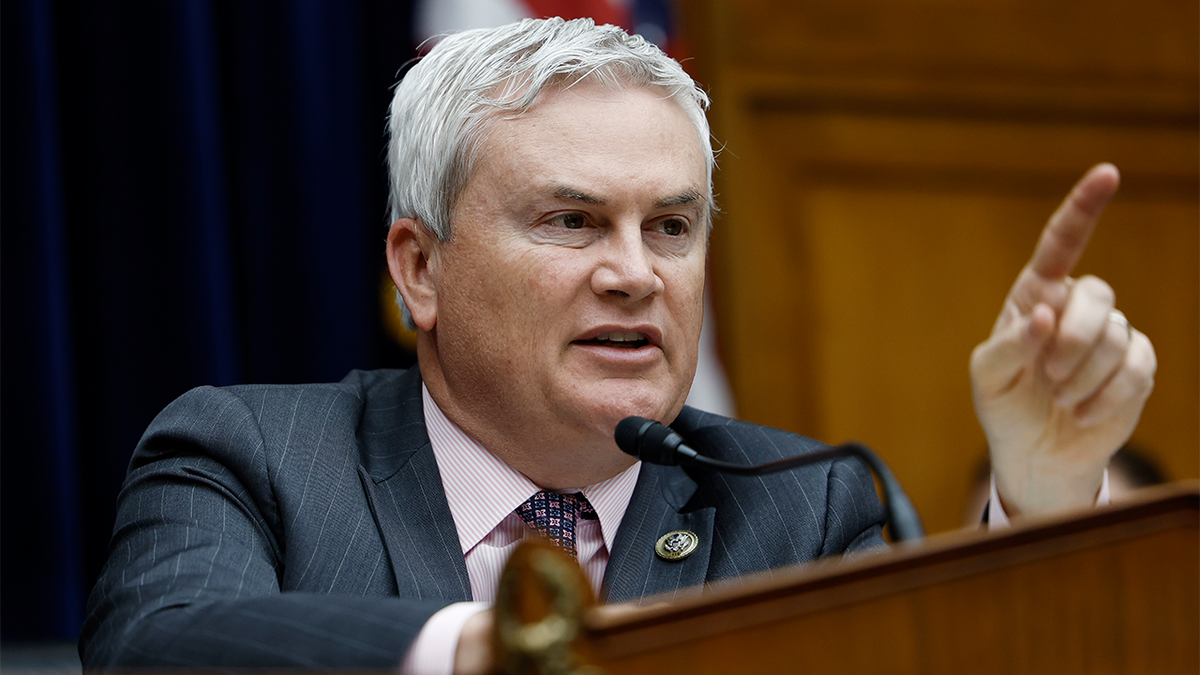
House Oversight and Accountability Committee Chairman James Comer is leading the probe into Biden. (Anna Moneymaker/Getty Images)
Jeff Zients, who served as Biden’s chief of staff for the final two years, was also asked to sit for a transcribed interview, a committee aide previously told Fox News Digital.
CLICK HERE TO GET THE FOX NEWS APP
A source familiar with the Biden team’s thinking previously called Republicans’ probe «dangerous» and «an attempt to smear and embarrass.»
«And their hope is for just one tiny inconsistency between witnesses to appear so that Trump’s DOJ prosecute his political opponents and continue his campaign of revenge,» that source said.
When reached for comment, Adrienne Watson, a representative for Sullivan, told Fox News Digital, «Jake did not have a conversation with Ron about Joe Biden running for president before the debate.»
Fox News Digital also reached out to Klain’s attorney as well as a contact for comment for Clinton but did not hear back by press time.
INTERNACIONAL
Un respiro para Pedro Sánchez: estalla un escándalo de corrupción de un ex ministro del Partido Popular de España
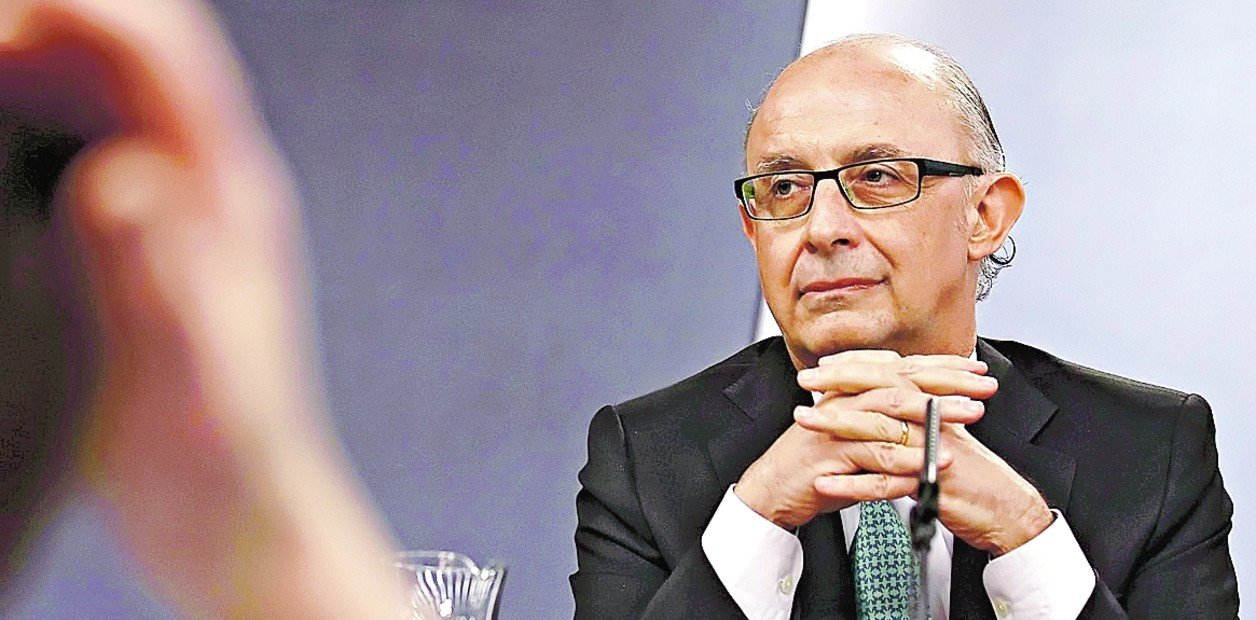
De viaje oficial por América del Sur -donde esquivó la Argentina por su falta de sintonía con el presidente Javier Milei-, Pedro Sánchez celebró, a la distancia, los dos años desde las últimas elecciones generales que le permitieron volver a ser elegido jefe del gobierno de España en julio de 2023.
Desde hace meses, las investigaciones judiciales que agobian a su entorno le dejan poco margen para festejar.
Porque a las denuncias presentadas contra su esposa, Begoña Gómez, por presunto tráfico de influencias, y a la imputación de su hermano, David Sánchez, por haber ocupado un puesto en la Diputación de Badajoz presumiblemente diseñado a medida para él, se suman la causa contra el fiscal general del Estado, por posible revelación de secretos, y la corrupción que involucra a dos ex altos funcionarios del Partido Socialista que Sánchez lidera por haber cobrado coimas en la adjudicación de obras públicas a empresas privadas.
Esta causa apunta al ex ministro de Transportes, José Luis Abalos, a un ex chofer suyo y asesor, Koldo García, y al ex secretario de organización del PSOE, Santos Cerdán, en prisión preventiva desde fines del mes pasado.
Con este peso sobre sus espaldas, Pedro Sánchez llegó a las puertas del verano europeo con el último aliento de resistencia a las presiones de la oposición para que presente su renuncia y convoque nuevas elecciones.
Hasta que hace unos días, el levantamiento del secreto de sumario de una investigación abierta en 2018 contra un ex ministro del Partido Popular (PP), la principal fuerza de la oposición, le dio un respiro al presidente Sánchez.
Cristóbal Montoro, ministro de Hacienda en el gobierno de José María Aznar, entre abril de 2000 y abril de 2004, y en el mandato de Mariano Rajoy, entre diciembre de 2011 y junio de 2018, está acusado de manipular leyes a medida para beneficiar a empresas privadas.
Las compañías presuntamente favorecidas con la legislación que Montoro se habría ocupado de hacer modificar o aprobar eran clientas de un estudio de abogados que el mismo Montoro había fundado antes de ingresar en la función pública como ministro.
“El uso de tales potestades habría permitido a Equipo Económico (el estudio que el ex ministro abrió en 2008) poder ofrecer a sociedades de distintos sectores reformas que beneficiasen sus intereses económicos, en menoscabo del sector público”, señala el auto del juez Rubén Rus, titular del Juzgado de Instrucción 2 de Tarragona, que acaba de hacerse público.
Según el juez, las empresas dedicadas al rubro energético del gas que contrataron al estudio de Montoro entre 2011 y 2019 habrían desembolsado unos 780 mil euros por sus servicios.
“Quien tiene que dar explicaciones, en sede judicial, es el señor Montoro”, defendió al PP la vocera del partido en el Congreso, Ester Muñoz.
“Por supuesto, van a intentar que esto parezca que es un empate”, agregó Muñoz en alusión al caso de corrupción dentro del Partido Socialista que le borró la sonrisa de la cara a Pedro Sánchez.
“Conviene no insultar a la inteligencia de los españoles -agregó la portavoz del PP-. Porque el caso Koldo (como se conoce en España al cobro de coimas de los ex funcionarios socialistas) afecta al gobierno actual.”
Las malas noticias para el Partido Popular, sin embargo, no terminan aquí. Noelia Núñez, una joven diputada del PP con proyección dentro del partido, acaba de renunciar a sus cargos políticos luego de admitir que en su currículum (CV) figuran estudios que nunca terminó.
Nuñez había sido elegida vicesecretaria de Movilización y Reto Demográfico del PP y en el CV que presentó en el Congreso de los Diputados y en otros organismos oficiales figuraba como licenciada. A veces en Derecho, en otras ocasiones, en Estudios Ingleses. Incluso llegó a adjudicarse un doble grado en Derecho y en Ciencias Jurídicas de las Administraciones Públicas en la UNED (Universidad Nacional de Educación a Distancia). Finalmente se supo que no se graduó en ninguna de las especializaciones de cuyos títulos académicos presumía.
“Con mi decisión muestro el camino a todos aquellos dirigentes socialistas que, con bastante más que esconder o tapar, siguen aferrados a sus cargos y sobreviven en política confiando en la amnesia de la gente o el engaño de los ciudadanos”, señaló la ex diputada en su renuncia, aludiendo al principal argumento de su partido: que Pedro Sánchez debería abandonar el Palacio de la Moncloa.
INTERNACIONAL
Rosas negras y ruinas sumergidas: así es Halfeti, la ciudad escondida en el Éufrates que resurgió entre el mito y la modernidad

En el sureste de Turquía, a orillas del legendario río Éufrates, una ciudad emerge parcialmente de las aguas, envuelta en misterio y leyendas.
Halfeti, conocida como la “ciudad sumergida”, tuvo que transformar radicalmente su fisionomía tras quedar parcialmente bajo el agua por la construcción de la presa de Birecik, en el año 2000.
Actualmente, este enclave no solo atrae a visitantes por su singular paisaje y arquitectura sumergida, sino que también fascina al mundo con el enigma de sus famosas “rosas negras“, flores que han dado lugar a mitos, debates científicos y un renovado sentido de identidad local, según reportó CNN Travel.

A principios del nuevo milenio, la construcción de la presa de Birecik, una estructura de 60 metros de altura y 2,4 kilómetros de ancho, provocó la inundación de dos pueblos y diez aldeas en la provincia de Sanliurfa.
Según consignan medios locales, alrededor del 40% de Halfeti, que contaba con unos 2.600 habitantes, quedó sumergido bajo las aguas. Entre las edificaciones perdidas se encontraban numerosas casas de piedra, comercios y una parte significativa de la Merkez Camii, la mezquita central del siglo XIX.
La presa de Birecik forma parte de un ambicioso plan de desarrollo para el sureste de Anatolia, que incluye varias de estas estructuras a lo largo de los ríos Éufrates y Tigris. Su embalse, de 52 kilómetros cuadrados, se diseñó para regar 70.000 hectáreas de tierras agrícolas y generar unos 2.500 GWh de electricidad al año, suficiente para abastecer a casi un millón de hogares turcos.

Sin embargo, el impacto en la población local fue profundo y, en muchos casos, doloroso. Más de 6.000 personas tuvieron que ser reubicadas, y la comunidad perdió parte de su patrimonio tangible e intangible. Erhan Yildirim, investigador local, historiador y guía profesional, expresó a CNN Travel: “No se puede recuperar la cultura; la cultura permanece bajo el agua”.
Antes de la inundación, la economía de esta población era, básicamente, agropecuaria, con una reputación especial por la producción de pistachos. Muslum Karaman, operador de barco local, relató a CNN Travel que “la gente de Halfeti solía ganarse la vida con la cría de ganado y la agricultura”. Sin embargo, la llegada de la presa y la consiguiente transformación del entorno los obligaron a buscar nuevas formas de subsistencia.
Karaman explicó que la ciudad “ha cambiado completamente hacia el turismo“, y que muchos habitantes han adaptado sus viviendas para convertirlas en restaurantes, boutique y cafeterías. Esta reinvención económica le permitió a la comunidad mejorar su calidad de vida y aprovechar el creciente interés de los visitantes por la singularidad de Halfeti.

En la actualidad, Halfeti se posiciona como un destino turístico singular. Los visitantes llegan atraídos por la posibilidad de recorrer en barco, moto acuática o flyboard la arquitectura sumergida de la ciudad antigua.
El buceo se ha convertido en una de las actividades favoritas, impulsada por la apneísta turca Şahika Ercümen, quien en 2020 realizó una inmersión en Halfeti para sensibilizar sobre la contaminación por plásticos.
Además de la arquitectura sumergida, los turistas pueden realizar excursiones en barco hasta la fortaleza de Rumkale, situada a orillas del Éufrates. Este sitio histórico, cuyos cimientos datan del Imperio bizantino, permite a los visitantes explorar restos de fortificaciones armenias y conocer la compleja historia de la región, marcada por el paso de diferentes civilizaciones.

Uno de los mayores atractivos de Halfeti es el misterio de sus “rosas negras“, flores que han dado lugar a leyendas y debates científicos. Según la tradición local, es el único lugar del mundo donde florecen.
Yildirim sostiene que “si cultivas la rosa negra en cualquier otro lugar, nunca te dará el mismo color”. No obstante, expertos internacionales cuestionan su existencia. Michael Marriott, reconocido especialista floricultura, declaró a CNN Travel: “No creo que ninguna de las llamadas flores negras sea realmente negra”.
Por otra parte, Guy Barter, horticultor jefe de la Royal Horticultural Society del Reino Unido, coincide en que “las rosas negras, y en general las flores negras, rara vez son completamente negras, si no de un granate muy intenso o, como en este caso, de un rojo muy oscuro”.
El color oscuro de las rosas de Halfeti se atribuye a las condiciones únicas del suelo y el clima de la región. Marriott sugiere que los agricultores locales podrían estar utilizando raíces originales de las rosas, capaces de prosperar en suelos más ácidos, lo que oscurece los pétalos. Birsen Aşağı, vendedora local, atribuye el fenómeno a las “condiciones climáticas de aquí”.

A pesar de las dudas sobre su autenticidad, las rosas negras de Halfeti han adquirido fama internacional. Marcas como la perfumista británica Penhaligon’s han lanzado fragancias inspiradas en la flor, y los productos derivados se han convertido en un símbolo de la ciudad.
Las leyendas locales enriquecen el mito de la rosa negra. Una de ellas narra la historia de Adir, un arquitecto que construyó la mezquita de la ciudad, y su nieta Vartuhi, quien cultivaba las rosas más hermosas.
Vartuhi se enamoró de Firat, un huérfano del otro lado del río, pero su amor fue prohibido. Desesperados, ambos se arrojaron al Éufrates y, desde entonces, las rosas de Halfeti florecen negras en señal de luto.
Otra versión, relatada por Yildirim, atribuye la flor al Diablo, quien, tras el asesinato de una niña inocente, decretó que la rosa negra solo florecería en el lugar de su muerte, como símbolo de dolor y venganza.

A pocos kilómetros del pueblo, la fortaleza de Rumkale se alza como testigo de la historia milenaria de la región. Según CNN Travel, sus cimientos datan del Imperio bizantino, entre los siglos V y VI, aunque existen indicios de estructuras anteriores.
Durante los siglos XII y XIII, la fortaleza fue residencia del Catholicós, líder espiritual de la Iglesia armenia, y posteriormente cayó en manos de los mamelucos en 1292, antes de pasar al control del Imperio Otomano. La arquitectura de Rumkale, visible desde el río, recuerda la compleja y a menudo turbulenta historia de Anatolia, marcada por el cruce de culturas y religiones.
En 2013, Halfeti fue reconocida como parte de la red Cittaslow, un movimiento internacional que promueve la calidad de vida y la preservación de la cultura local.

 ECONOMIA2 días ago
ECONOMIA2 días agoEl consumo en Argentina crece 4% en junio, ante menor inflación y más crédito

 CHIMENTOS2 días ago
CHIMENTOS2 días agoEl desgarrador testimonio del hermano de Locomotora Oliveras: “El daño es irreversible, solo puede vivir con respirador”

 POLITICA2 días ago
POLITICA2 días agoLos organizadores de la Derecha Fest pasaron un video de Villarruel y algunos asistentes gritaron “traidora”














